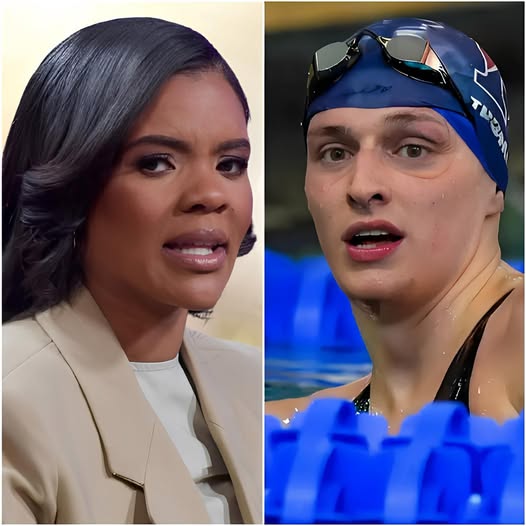It’s a debate that has sparked conversations worldwide and drawn sharp divides in public opinion: the role of transgender athletes in women’s sports. Leading the charge for change, conservative commentator Candace Owens has made headlines by demanding that Lia Thomas, the transgender swimmer who has dominated collegiate competitions, be banned from participating in women’s sports.
Owens argues that this step is essential to protect the fairness and integrity of female athletics, reigniting a contentious topic that has captivated sports and cultural discussions alike.
Owens, known for her outspoken views, voiced her opinion during a recent public appearance and on her social media platforms. “Allowing biological males to compete in women’s sports undermines everything women have fought for over the decades,” Owens declared.
She further stated that fairness in sports is not just about participation but about ensuring that female athletes compete on an equal playing field. “This is not about hate; it’s about maintaining the integrity of female competition,” she added.

The controversy surrounding Lia Thomas began when the swimmer transitioned and began competing in women’s collegiate swimming events, achieving record-breaking victories that sparked backlash from competitors, parents, and some advocacy groups.
Critics argue that Thomas, despite meeting NCAA guidelines for transgender athletes, retains physiological advantages due to biological male attributes, which they believe creates an unfair competitive edge.
Supporters of Thomas, however, emphasize the importance of inclusivity and the rights of transgender individuals to participate in sports as their authentic selves. They argue that Thomas’s participation aligns with broader goals of diversity and equality in athletics. For every voice calling for Thomas to be banned, there is another urging empathy and inclusion.
Owens has dismissed these counterarguments, framing the issue as a matter of principle. “This isn’t about inclusivity; it’s about biology,” she said.
Owens emphasized that allowing transgender women to compete against biological females could erode decades of progress in women’s sports, including opportunities for scholarships, recognition, and professional advancement. “If we don’t stand up now, what’s the point of having women’s sports at all?” she questioned.
The debate has drawn in prominent voices on both sides of the issue. Advocates for transgender athletes argue that participation is a human right and caution against policies that could marginalize transgender individuals further.
Meanwhile, opponents like Owens highlight concerns about fairness and the impact on cisgender female athletes, particularly in physically demanding sports where biological differences can significantly influence outcomes.
The broader implications of Owens’ statements extend beyond sports. The issue has become a flashpoint in the ongoing cultural battles over gender identity, rights, and equality.
Some see Owens’ call as a rallying cry to preserve traditional definitions of gender in competitive spaces, while others view it as a step backward in efforts to create a more inclusive society.
Athletes, too, are weighing in. Several female swimmers, some of whom competed against Thomas, have voiced their frustrations, claiming they felt disadvantaged. An anonymous swimmer from Thomas’s collegiate league shared, “It’s disheartening. We train just as hard, but there’s an undeniable difference when competing against someone with biological advantages.”
Sports governing bodies are also grappling with this issue. While the NCAA has implemented guidelines for transgender athlete participation, critics like Owens argue these policies are insufficient and fail to address the competitive imbalance.
International sports organizations, including the IOC, have faced similar challenges, with policies varying widely across disciplines and events.
Public reaction to Owens’ stance has been predictably divided. Her supporters praise her for defending women’s rights and bringing attention to an uncomfortable but necessary topic. Detractors accuse her of perpetuating harmful stereotypes and ignoring the complexities of gender identity.
As the conversation continues, the stakes remain high. The decisions made in the coming years could reshape the landscape of women’s sports and influence broader societal discussions about gender and fairness.
For Owens, the fight is far from over. She has vowed to continue advocating for policies that she believes protect the integrity of female competition, even as the backlash intensifies.











